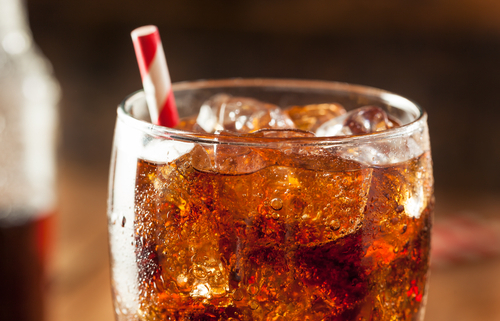Cancer’s Sweet Tooth
Cancer loves sugar, and sugar really loves cancer. Isn’t that sweet? Actually, no, it’s more like a match made in hell – because sugar (glucose) makes many types of cancer grow faster.
Scientists have long known that cancers soak up glucose like a sponge; in fact, German physiologist Otto Warburg, who found that tumors extract glucose at a rate 20 to 50 times higher than do normal cells, won the 1931 Nobel Prize for for his research on metabolism. Lew Cantley told me that. Cantley, Ph.D., is a world-renowned scientist and Director of the Sandra and Edward Meyer Cancer Center at Weill Cornell Medicine. I recently interviewed him for the Prostate Cancer Foundation’s website, pcf.org.
Cantley has spent much of his career studying the interplay between sugar and cancer. His studies suggest that it’s not so much the amount of glucose in your bloodstream that helps promote cancer, as it is the level of insulin, the hormone made by the pancreas that controls glucose. Insulin helps turn glucose into immediate energy, and also helps your body pack it away for longer-term storage. Briefly, when you eat, your blood sugar goes up; this causes your pancreas to say, “Hey! We need to make more insulin!” Insulin, like Paul Revere, then travels rapidly throughout the land, telling the cells to let the glucose in, either to be used right away or saved in muscles, fat cells, and the liver.
Why does a tumor suck up more glucose? “The main reason,” says Cantley, “is that insulin can turn on the glucose transporters (proteins on cell membranes that carry glucose into cells), similar to those in the liver, muscle and fat. The presence of those glucose transporters on tumor cells is in part regulated by insulin. That’s why I keep focusing on the insulin.”
Cantley began studying the insulin receptor in the 1980s, when he was on the faculty at Harvard University. A few years later, after moving to Tufts University, he discovered an enzyme called phosphoinositide-3-kinase (PI3K); PI3K signals cells that insulin is present; the cells, in turn, open the valve that lets in sugar. Normally, PI3K does good and vital work, helping cells survive, grow and proliferate. But sometimes it goes awry; in Type II diabetes, this PI3K pathway becomes sluggish, cells don’t respond appropriately to insulin and become insulin-resistant. But in cancer, even in someone who’s insulin-resistant, PI3K does its job too well; glucose floods in, tumor cells feast on sugar and grow faster. “What we now know is that mutations in the PI3K pathway make tumor cells hyperactive in response to insulin.”
In many cancers – sugar-loving cancers; not all cancers are addicted to sugar, but many are – PI3K is like a power switch that drives growth. “PI3K is the most frequently mutated cancer-promoting gene in humans,” says Cantley. It may be involved in as many as 80 percent of cancers, including breast cancer, bladder cancer, and certain brain tumors.
What about prostate cancer? Well, one of the most common genetic events in prostate cancer is the loss of a gene called PTEN; cancer just knocks this gene out. “PTEN makes an enzyme that reverses what PI3K does. PI3K makes a lipid, and PTEN destroys that lipid; you have to have a balance between those two enzymes to keep growth under control. But in prostate cancer, and in breast cancer , the loss of PTEN activates production of this lipid that drives cell growth.
“This tells us we probably should try to keep insulin levels as low as possible if we have cancer, to try to keep the tumor from growing. If we can keep the diet under control, or exercise to keep glucose levels and insulin levels low, we have a much better chance of slower growth of the tumor. Our research would also argue that pharmacological intervention would be more effective if we keep insulin levels low.”
Even better: Keep insulin levels as low as possible anyway, whether you have cancer or not. “This is a powerful potential cancer-prevention mechanism,” says Howard Soule, Ph.D., Executive Vice President and Chief Science Officer for the PCF. “Reducing processed sugar may turn out to be even more important for cancer prevention than treatment.”
Can we learn to use cancer’s sweet tooth as a weapon against it? Cantley’s research has already led to the development of several PI3K-inhibiting drugs: idelalisib, approved by the FDA in 2014 for treatment of lymphoma and leukemia and alpelisib, approved in 2019 for treating breast cancers with mutations in PI3K. But Cantley also believes that changing the diet – to one low in sugar, but also low in other carbohydrates, which can cause blood sugar to spike – can make cancer-fighting treatments work even better. In a landmark 2018 paper published in Nature, Cantley and colleagues showed in mice that by severely restricting carbohydrates “and keeping the insulin level low, tumors would respond much more dramatically to drugs that are already approved to treat them. Tumors we had never been able to shrink in mice, we could shrink with a low-glucose diet.
“That’s my obsession now, to get that message out there. Endocrinologists tell patients to exercise more and eat less sugar to keep diabetes under control, but for me, it’s even more critical to keep insulin levels low in order to get better outcomes for cancer patients.” Cantley’s research suggests that “if you have a mutation in the PI3K pathway that causes cancer, and you’re eating a lot of simple carbohydrates, every time your insulin goes up, it’s making the tumor grow.”
How can this knowledge help slow the growth of prostate cancer? Here’s one example: “For prostate cancer patients with low Gleason scores who are on active surveillance, it makes perfect sense to pay a lot of attention to what you eat. Try to keep your consumption of sugary drinks as low as possible. Keeping sugar down is the best thing you can possibly do.” It used to be, Cantley notes, Japanese men hardly ever got prostate cancer. “But second-generation Japanese Americans have prostate cancer in similar rates to Caucasians. It’s clearly lifestyle,” the Western diet. “The truth probably is that some Japanese men in their 90s had some level of prostate cancer, but didn’t consume enough sugar for the cancer to advance.”
Here’s another: If you are on ADT for metastatic prostate cancer, you are more likely to gain weight, and also to develop insulin resistance. One way to fight this is by limiting your sugar and simple-to-digest carbs. Bonus: keeping insulin down may also help slow down the cancer. Watch out for protein drinks, too; many are loaded with sugar.
What about the ketogenic diet? It’s low in carbs and high in fats. “I’m not preaching the ketogenic diet; I don’t eat it myself,” says Cantley, who says he weighs the same now as he did in high school. “I eat what my grandparents ate: a healthy diet, lots of raw vegetables, some animal fat, healthy vegetable fats, an intermediate amount of protein. I don’t avoid fats, but I prefer olive oil on salads, and healthy fats from fish and avocado,” instead of loading up on butter and cheese. “I eat more protein than the ketogenic diet would recommend, and I do occasionally eat rice and pasta.”
But here’s the kicker: “The one thing I’m fanatic about is not drinking anything with sugar: no orange juice, no apple juice, no soda. I’ll eat an orange, but I won’t grind it up and drink it.” Sugar in liquid form is rapidly digested, which results in “glucose peaks, followed by insulin peaks.”
What about alcohol? “A dry martini is probably safer than wine; there’s not much sugar in there.” However, Cantley adds, “I do drink wine, but as low in sugar as possible.”
Exercise is a great way to divert sugar into someplace safe: the muscles. “Muscle is where you store a lot of sugar in your body. If you drink a sugary drink after exercising, your insulin goes up, and you drive all that glucose into your muscle. Whether you’re exercising at the time you drink a sugary drink, or you just put on muscle from exercise in general, there’s still a benefit: insulin won’t spike.” However, exercise doesn’t make it safer to drink a lot of sugary drinks, because…
Sugary drinks are bad. It’s not just sodas; sweet teas and coffee drinks have more sugar than you may realize. Even sports drinks are loaded with sugar. In 2019, Cantley and colleagues published another landmark paper in Science, involving mice with polyposis syndrome (mice genetically predisposed to developing polyps in the colon). They demonstrated that sugary drinks can dramatically drive the growth of intestinal polyps. “We gave mice high-fructose corn syrup, and their polyps grew two to three times faster.” Fructose is a different sugar from glucose, and although “fructose is not consumed by tumors, it goes straight to the liver and turns into fat. Fructose makes you fat. But the other issue is that intestinal epithelial cells can directly consume fructose. We think this explains why there has been a doubling to tripling rate of colorectal cancer in young adults.”
Consuming sugar in liquid form is worse than having that same amount of sugar in solid form. Cantley explains: “If you eat an apple, it takes a long time to get to the colon. By the time it gets there, all that sugar has leached out. But if you have that same amount of sugar in a drink, that watery sugar gets to the colon pretty quickly. That’s independent of the insulin elevation (discussed above), and it’s another scary reason why young people should avoid drinking sugary drinks, no matter how much you exercise. You may be a champion marathon runner, but if you’re drinking sugary drinks all the time to keep up your energy, this is a real warning that you should pay attention to.”
Now, back to prostate cancer: Would taking a PI3K-inhibitor help slow cancer’s growth? As is often the case with prostate cancer, it’s not that simple. It turns out that there are two different kinds of PI3K, an alpha and a beta form that can contribute to prostate cancer. “When prostate cancer loses PTEN, it uses PI3K alpha and beta form redundantly to drive the tumor.” This means that a drug that targets only the alpha form probably won’t be as effective in prostate cancer as in other forms of cancer, where only the alpha form of PI3K is involved.
However, “our preclinical findings are overwhelmingly supportive, and the retrospective data in patients strongly suggests” that one day, in addition to surgery, radiation, hormonal therapy or other treatments for prostate cancer, patients will be prescribed a precision diet to make the treatment more successful. “The more we learn about cancer metabolism, we are understanding that cancers are addicted to particular things. For many cancers, that thing is sugar.”
In addition to the book, I have written much more about prostate cancer on the Prostate Cancer Foundation’s website, pcf.org. The stories I’ve written are under the categories, “Understanding Prostate Cancer,” and “For Patients.” As Patrick Walsh and I have said for years in our books, Knowledge is power: Saving your life may start with you going to the doctor, and knowing the right questions to ask. I hope all men will put prostate cancer on their radar. Get a baseline PSA blood test in your early 40s, and if you are of African descent, or if cancer and/or prostate cancer runs in your family, you need to be screened regularly for the disease. Many doctors don’t do this, so it’s up to you to ask for it.
©Janet Farrar Worthington




Leave a Reply
Want to join the discussion?Feel free to contribute!